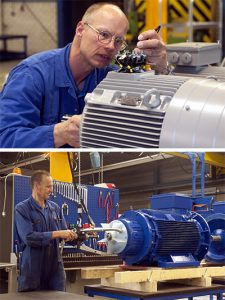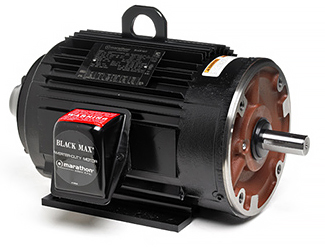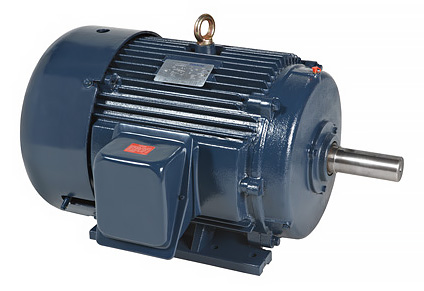
With the increased use of Motor Drive packages, the question of when to use an inverter duty motor vs. a standard motor often arises.
The term “inverter-duty” refers to a motor whose speed is controlled by an inverter or VFD (variable frequency drive). While both inverter-duty motors and standard motors are capable of operating under VFDs, the main differences lie in construction and capability.
The more demanding the application is, the more specifications the motor must have to accommodate it. You can determine which motor would best optimize your operational efficiency by answering these three key application questions:
1. Is the Application Constant Torque or Variable Torque?
The first factor to consider when determining whether to use an inverter duty motor vs. a standard motor is the torque capability. Variable torque applications, like fan and pump applications, require more torque as the speed increases. Standard motors generally will not overheat based on reduced torque and current requirements at lower speeds. Therefore, variable torque applications are typically paired with standard motors.
Constant torque applications, like conveyors or general machine applications, require the same amount of torque throughout the speed range. Because inverter-duty motors are designed to operate at low speeds and not overheat, inverter-duty motors can produce a wider constant torque speed range than a standard motor.
2. What is the Maximum and Minimum RPM Speed the Motor Will Run At?
Due to the motors’ unique capabilities, specifying the application’s range of speed can often point you in the right direction when considering an inverter duty motor vs. a standard motor.
Depending on the size (HP) and type, a standard, totally enclosed fan-cooled motor is proficient for a 4:1 up to a 10:1 constant torque speed range. If the application requires a speed range beyond what is noted on the standard duty motor nameplate, an inverter duty motor should be considered. Inverter duty motors can accommodate speed ranges up to 1000:1 or more and are capable of providing full-rated torque at zero speed, as well as operating over its base speed.
3. What is the Duty Cycle and Dynamic Performance Required for the Application?
A motor’s duty cycle, or the number of times per hour the motor starts/stops, and dynamic performance, or how quickly the motor is required to get the load up to speed, are two key indicators for determining the type of motor performance required.
In applications where speed synchronization is critical for optimum production quality, like electronic line shafting, inverter duty motors with encoders are preferred for their ability to provide rotor speed and position information.
When needed, inverter duty motors can offer wider speed ranges, encoder kits, and motor cooling designs for slow-speed operation.
Marathon’s Top-Performing Line of Inverter Duty Motors Are Built To Last


The Marathon® brand has been a leader in the motor industry, creating motors that have stood the test of time in the most demanding applications.
The BlackMAX® and BlueMAX® inverter duty motors, with the patented MAX GUARD® insulation system, have stood the test of time as the choice of the design engineer when specifying variable speed motors for the most demanding applications. With an unlimited lead length and protection against the potentially destructive forces associated with the high switching frequencies of today’s PWM drives, you can be assured of a reliable and dependable performance year after year.
Need Assistance Choosing An Inverter Duty Motor vs. Standard Motor?
At IBT, we have a dedicated team of electrical product specialists who have been consulting customers on every aspect of electric motors and helping them solve their toughest electrical problems since the 1970s. Let our electrical experts help you specify motor and drive system components for your application. Contact Joe Purcell, IBT’s Electrical Group Director, or give us a call at 913-677-3151 today!


Shop Our Online Catalog of Motors
Check out ShopIBT.com to find the right motor for your needs!





